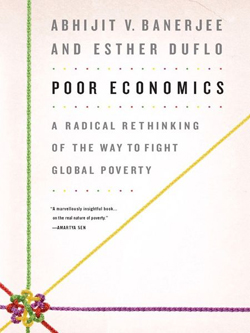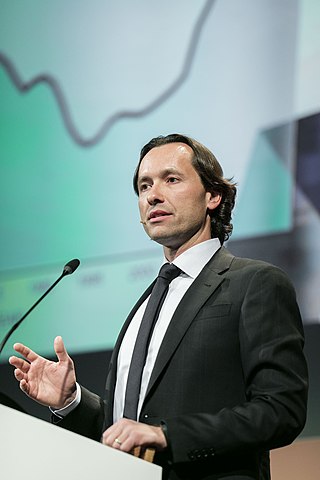
Sendhil Mullainathan is an American professor of economics at the Massachusetts Institute of Technology. He was a professor of Computation and Behavioral Science at the University of Chicago Booth School of Business from 2018-2024. He is the author of Scarcity: Why Having Too Little Means So Much. He was hired with tenure by Harvard in 2004 after having spent six years at MIT.

South Point is a higher-secondary co-educational private school located in Kolkata, West Bengal and affiliated to Central Board of Secondary Education, consisting of three organisations – South Point School, South Point High School and South Point Education Society. The school operates in two shifts for all classes: morning and afternoon. The school opened in 1954 and was the first co-educational school in Kolkata. Higher secondary (10+2) education was introduced in 1960.
The MIT Department of Economics is a department of the Massachusetts Institute of Technology in Cambridge, Massachusetts.

Michael Robert Kremer is an American development economist currently serving as University Professor in Economics at the University of Chicago and Director of the Development Innovation Lab at the Becker Friedman Institute for Research in Economics. Kremer formerly served as the Gates Professor of Developing Societies at Harvard University, a role he held from 2003 to 2020. In 2019, Kremer was jointly awarded the Nobel Memorial Prize in Economic Sciences, together with Esther Duflo and Abhijit Banerjee, "for their experimental approach to alleviating global poverty."

Esther Duflo, FBA is a French-American economist currently serving as the Abdul Latif Jameel Professor of Poverty Alleviation and Development Economics at the Massachusetts Institute of Technology (MIT). In 2019, she was jointly awarded the Nobel Memorial Prize in Economic Sciences alongside Abhijit Banerjee and Michael Kremer "for their experimental approach to alleviating global poverty".

Seva Mandir is an Indian grassroot NGO based in Udaipur, in Rajasthan state, founded by Dr. Mohan Sinha Mehta in 1968. Seva Mandir works mainly in natural resource development and sustainability, village development, women empowerment, education and health care, continuing education, and children's welfare.

The Abdul Latif Jameel Poverty Action Lab (J-PAL) is a global research center based at the Massachusetts Institute of Technology aimed to reducing poverty by ensuring that policy is informed by rigorous, scientific evidence. J-PAL funds, provides technical support to, and disseminates the results of randomized controlled trials evaluating the efficacy of social interventions in health, education, agriculture, and a range of other fields. As of 2020, the J-PAL network consisted of 500 researchers and 400 staff, and the organization's programs had impacted over 400 million people globally. The organization has regional offices in seven countries around the world, and is headquartered near the Massachusetts Institute of Technology in Cambridge, Massachusetts.

Dean Karlan is an American development economist and social entrepreneur currently serving as chief economist of the United States Agency for International Development. Alongside his role at USAID, he is the Frederic Esser Nemmers Distinguished Professor of Economics and Finance at Northwestern University where, alongside Christopher Udry, he co-directs the Globe Poverty Research Lab at the Kellogg School of Management.

Rachel Glennerster is a British economist. She is an Associate Professor of Economics at the University of Chicago. She has been announced as the new president for the Center for Global Development, starting in September 2024.
Chawlang Amarjyoti Dutta(born 23 October 1996) is an Indian Business Entrepreneur and a film Graduate. He is the founder and former executive director of Autox Assam, a car accessories dealer based in Assam, India and also own a pharmacy named Generic Aadhar in Duliajan that provides affordable medicine to the community

Poor Economics: A Radical Rethinking of the Way to Fight Global Poverty (2011) is a non-fiction book by Abhijit V. Banerjee and Esther Duflo, both professors of Economics at Massachusetts Institute of Technology (MIT) and Nobel Memorial Prize in Economic Sciences laureates. The book reports on the effectiveness of solutions to global poverty using an evidence-based randomized control trial approach. It won the 2011 Financial Times and Goldman Sachs Business Book of the Year Award.

Edward "Ted" Andrew Miguel is an American development economist currently serving as the Distinguished Professor of Economics and Oxfam Professor of Environmental and Resource Economics at the University of California, Berkeley. He is the founder and faculty co-director of the Center for Effective Global Action (CEGA), a Berkeley-based hub for research on development economics.
Rohini Pande is an economist who is currently the Henry J. Heinz II Professor of Economics and Director of the Economic Growth Center at Yale University. She was previously the Rafik Hariri Professor of International Political Economy and Mohammed Kamal Professor of Public Policy at Harvard Kennedy School. Pande was the Co-Director of Center for International Development at Harvard University's Evidence for Policy Design research program (EPoD) and serves on the board of directors of the Abdul Latif Jameel Poverty Action Lab, MIT. She also serves on the board of the Bureau for Research and Economic Analysis of Development (BREAD), the Committee on the Status of Women in the Economic Profession (CSWEP) and as a co-editor of the American Economic Association's (AEA) journal American Economic Review: Insights. She is a Faculty Research Associate at NBER, CEPR and the IFPRI. Her research focuses on the economic analysis of the politics and consequences of different forms of redistribution, principally in developing countries. Her outstanding and empirical findings in fields of governance and accountability, women’s empowerment, role of credit in poverty, the economic aspects of the environment and the potential of policy design in these areas, won her the Infosys Prize 2022 in Social Sciences.
Pascaline Dupas is a French economist whose research focuses on development economics and applied microeconomics, with a particular interest in health, education, and savings. She is a professor in economics and public affairs at Princeton University and is a co-chair of the Poverty Action Lab's health sector. She received the Best Young French Economist Prize in 2015.
Rema Hanna is an economist and is the Jeffrey Cheah Professor of South East Asia Studies at Harvard University's Kennedy School of Government. Moreover, she currently serves as co-director of the Evidence for Policy Design (EPoD) research programme at Harvard's Center for International Development and a scientific co-director for Southeast Asia at the Abdul Latif Jameel Poverty Action Lab (J-PAL). Her research focuses on the efficiency and effectiveness of public services in developing countries, with specific focus on service delivery and the impacts of corruption. She is also the co-chair of the editorial board for the academic journal Review of Economics and Statistics.

Good Economics for Hard Times: Better Answers to Our Biggest Problems is a 2019 nonfiction book by Abhijit V. Banerjee and Esther Duflo, both professors of economics at MIT. It was published on November 12, 2019 by PublicAffairs (US), Juggernaut Books (India), and Allen Lane (UK). The book draws from recent developments in economics research to argue solutions to the issues facing modern economies and societies around the world, including slowing economic growth, immigration, income inequality, climate change, globalization and technological unemployment. It is their second collaborative book since the publication of their book Poor Economics: A Radical Rethinking of the Way to Fight Global Poverty (2011) and their first since becoming a married couple in 2015. The book's publication comes a month after Banerjee and Duflo were jointly awarded the Nobel Prize in Economics, shared with Harvard University professor Michael Kremer.
Jeanne Lafortune is a Canadian economist who currently works as an Full Professor in Economics and Director of Research at the Pontifical Catholic University of Chile. She is also a researcher at the Abdul Latif Jameel Poverty Action Lab, which is a global research center that aims to reduce poverty and improve life quality of people in the Caribbean and Latin America. Lafortune holds a Ph.D. in economics from the Massachusetts Institute of Technology (MIT), Cambridge, Massachusetts. Her research interests focus on three main fields, including economic history, family and development economics.
The 2019 Nobel Memorial Prize in Economic Sciences was awarded jointly to the economist couple Abhijit Banerjee, Esther Duflo-Banerjee and their colleague Michael Kremer "for their experimental approach to alleviating global poverty". Banerjee and Duflo are the sixth married couple to jointly win a Nobel Prize. The press release of the Royal Swedish Academy of Sciences noted:
"The research conducted by this year's Laureates has considerably improved our ability to fight global poverty. In just two decades, their new experiment-based approach has transformed development economics, which is now a flourishing field of research. They have laid the foundations of the best way to design measures that reduce global poverty"
Emily Louise Breza is an American development economist currently serving as the Frederic E. Abbe Professor of Economics at Harvard University. She is a board member at the Abdul Latif Jameel Poverty Action Lab, and an affiliated researcher at the International Growth Centre and National Bureau of Economic Research. Breza's primary research interests are in development economics, in particular the interplay between social networks and household finance. She is the recipient of a Sloan Research Fellowship.












